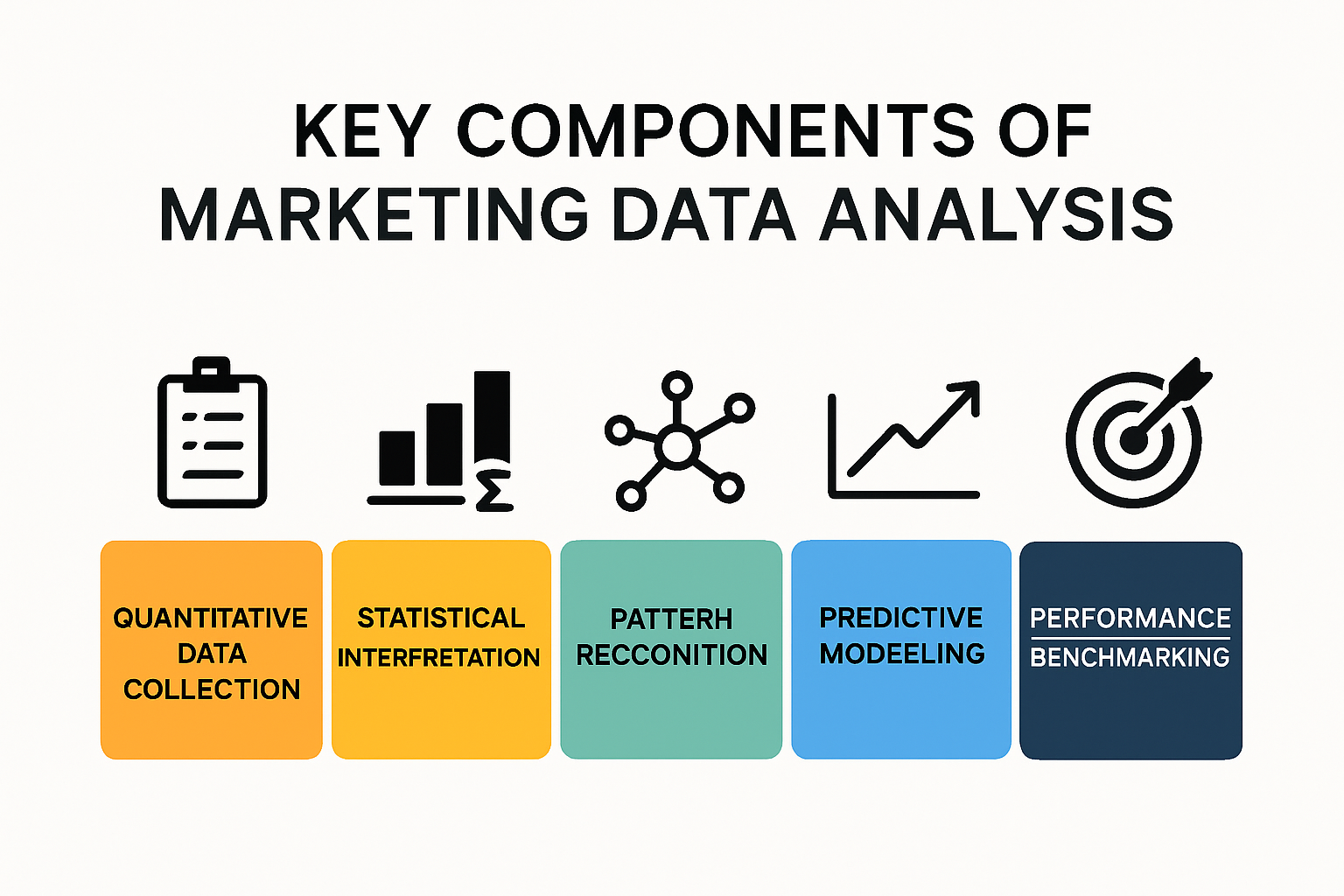Marketers are now collecting and examining more customer data than ever before. In fact, data-driven organisations are 23 times more likely to attract new customers and 6 times more likely to keep them. Yet most believe the real value lies in the numbers themselves. The surprise comes when you realise that data analysis is not about the volume of raw figures but about the hidden insights that transform how brands connect with their audiences.
Table of Contents
- What Is Data Analysis And Its Role In Marketing?
- Why Data Analysis Matters For Marketing Success
- Key Concepts Of Data Analysis In The Marketing Context
- How Data Analysis Transforms Marketing Strategies
- Real-World Applications Of Data Analysis For Marketers
Quick Summary
| Takeaway | Explanation |
|---|---|
| Data analysis drives strategic marketing decisions | Leveraging insights from data enables marketers to make informed choices, improving effectiveness and reducing risk. |
| Hyper-personalisation enhances customer engagement | Understanding detailed customer preferences allows for tailored marketing approaches, significantly increasing conversion rates. |
| Predictive analytics anticipates market trends | Marketers can use advanced techniques to foresee customer needs, shifting from reactive to proactive strategies. |
| Data-driven organisations outperform competitors | Companies that effectively utilise data are significantly more likely to acquire and retain customers than those that do not. |
| Implement advanced tools for better insights | Embrace sophisticated analytical techniques and technologies to unlock valuable insights and improve marketing performance. |
What is Data Analysis and Its Role in Marketing?
Data analysis in marketing represents a strategic approach to understanding complex customer interactions, transforming raw information into actionable insights that drive business growth. At its core, data analysis for marketers is about systematically examining, cleaning, and interpreting digital information to make informed decisions.
Understanding the Fundamentals of Marketing Data Analysis
Marketing data analysis involves collecting and examining multiple data points from various sources like website traffic, social media interactions, customer purchases, and campaign performance. The primary objective is to uncover patterns, trends, and relationships that reveal deeper insights about customer behaviour and market dynamics.
Key components of marketing data analysis include:
- Quantitative metrics tracking customer engagement
- Behavioural pattern recognition
- Predictive modelling of potential market trends
According to McKinsey Global Institute, data-driven organisations are 23 times more likely to acquire customers and 6 times more likely to retain them compared to non-data-driven competitors.
Transforming Raw Data into Marketing Strategy
Successful data analysis for marketers goes beyond simple number crunching. It requires sophisticated techniques that translate complex datasets into clear, strategic recommendations. Marketers use advanced analytical tools to segment audiences, personalise communication, and optimise marketing spend.
By understanding granular details about customer preferences, businesses can create targeted marketing approaches that significantly improve conversion rates and customer satisfaction.
Data analysis enables marketers to move from reactive to proactive strategies, anticipating customer needs before they become explicit market demands. This predictive capability represents the true power of modern marketing intelligence.
Why Data Analysis Matters for Marketing Success
In the rapidly evolving digital marketplace, data analysis has transformed from a competitive advantage to an absolute necessity for marketing success. Modern marketing strategies are fundamentally data-driven, enabling businesses to make precise, informed decisions that directly impact revenue and customer engagement.
Driving Strategic Decision Making
Data analysis provides marketers with unprecedented insights into customer behaviour, preferences, and potential market opportunities. By systematically examining complex datasets, businesses can move beyond intuition and gut feelings, replacing them with evidence-based strategies that minimise risk and maximise potential returns.
Key strategic benefits include:
- Precise audience segmentation
- Personalised marketing campaigns
- Accurate performance measurement
- Resource allocation optimisation
According to West Virginia University, marketing analytics enables businesses to reduce risks, improve efficiency, and anticipate emerging market trends with remarkable accuracy.
Enhancing Customer Understanding and Experience
Deep data analysis allows businesses to construct comprehensive customer profiles that go far beyond traditional demographic information. Marketers can now understand not just who their customers are, but precisely what they want, when they want it, and through which channels they prefer to engage.
Explore our advanced campaign performance tracking to understand how granular data insights can transform your marketing approach. These insights enable businesses to create hyper-personalised experiences that significantly improve customer satisfaction and loyalty.

By leveraging sophisticated analytical techniques, companies can predict customer needs, personalise interactions, and develop products or services that resonate deeply with their target audience. This predictive capability represents the pinnacle of modern marketing intelligence, turning data into a strategic asset that drives sustainable business growth.
Key Concepts of Data Analysis in the Marketing Context
Data analysis in marketing represents a sophisticated approach to understanding complex customer interactions through systematic examination of digital information. Modern marketers leverage advanced analytical techniques to transform raw data into strategic insights that drive business performance.
Core Components of Marketing Data Analysis
Effective marketing data analysis comprises multiple interconnected components that work together to generate meaningful insights. These fundamental elements enable businesses to decode customer behaviour and make informed strategic decisions.
Key foundational components include:
- Quantitative data collection
- Statistical interpretation
- Pattern recognition
- Predictive modelling
- Performance benchmarking

To help clarify the fundamental components that make up marketing data analysis, the following table organises the key building blocks and their descriptions.
| Component | Description |
|---|---|
| Quantitative data collection | Gathering measurable data such as website visits, clicks, and purchases |
| Statistical interpretation | Analysing data sets to identify trends and relationships |
| Pattern recognition | Detecting recurring behaviours or tendencies in customer data |
| Predictive modelling | Forecasting future trends or customer actions using existing data |
| Performance benchmarking | Comparing results to standards or competitors to measure effectiveness |
Successful implementation requires understanding how different data sources interact and contribute to a comprehensive marketing intelligence framework. Sophisticated analytical approaches go beyond simple metric tracking, providing nuanced perspectives on customer preferences and market dynamics.
Interpreting Complex Marketing Datasets
Marketing data analysis involves translating complex numerical information into actionable strategic recommendations. By applying advanced statistical techniques, businesses can uncover hidden patterns and relationships within their customer data.
Learn more about interpreting user behaviour data to understand the intricate process of transforming raw information into strategic marketing insights. These analytical methods help organisations move from reactive to proactive marketing strategies.
According to research published in the National Center for Biotechnology Information, effective data analysis in marketing requires rigorous assessment of data quality, robust statistical modelling, and a comprehensive understanding of customer interaction dynamics.
By mastering these key analytical concepts, marketers can develop more targeted, personalised, and effective marketing strategies that directly respond to evolving customer needs and market trends.
How Data Analysis Transforms Marketing Strategies
Data analysis has fundamentally revolutionised marketing strategy, shifting businesses from intuition-based decision-making to precision-driven, evidence-backed approaches. By leveraging sophisticated analytical techniques, modern marketers can create highly targeted, responsive, and efficient strategies that directly address customer needs.
Strategic Precision Through Advanced Analytics
Data analysis enables marketers to deconstruct traditional marketing approaches, replacing broad-based campaigns with hyper-personalised, contextually relevant interactions. This transformation occurs through multiple sophisticated mechanisms that provide unprecedented insights into customer behaviour and market dynamics.
Key strategic transformation areas include:
- Predictive customer behaviour modelling
- Real-time campaign performance tracking
- Granular audience segmentation
- Dynamic pricing strategies
- Personalised communication channels
The ability to predict and respond to emerging market trends with remarkable accuracy represents a significant competitive advantage for data-driven organisations.
The table below summarises key areas where data analysis transforms marketing strategy, providing concise explanations of each transformation area.
| Strategic Area | Description |
|---|---|
| Predictive customer behaviour | Using data to anticipate future customer actions and preferences |
| Real-time campaign tracking | Monitoring campaign results instantly to enable timely adjustments |
| Granular audience segmentation | Dividing audiences into specific groups for targeted marketing |
| Dynamic pricing strategies | Adjusting prices based on market and customer data |
| Personalised communication channels | Tailoring messages through the platforms preferred by individual customers |
Implementing Data-Driven Marketing Transformation
Successful marketing strategy transformation requires more than just collecting data. It demands a comprehensive approach that integrates advanced analytical tools, robust technological infrastructure, and a cultural shift towards data-centric decision-making.
Discover advanced campaign performance tracking methods to understand how granular data insights can fundamentally reshape marketing approaches. These techniques allow businesses to move beyond traditional reactive strategies towards proactive, anticipatory marketing models.
According to Harvard Business Review, organisations that successfully integrate data analysis into their marketing strategies can achieve up to 20% higher marketing ROI compared to traditional approaches. This transformation represents not just an incremental improvement, but a fundamental reimagining of how businesses understand and engage with their customers.
Real-World Applications of Data Analysis for Marketers
Marketing data analysis transcends theoretical concepts, offering tangible, practical solutions that transform how businesses understand and engage with customers. By applying sophisticated analytical techniques, marketers can unlock profound insights that drive strategic decision-making and enhance overall business performance.
Practical Data Analysis Techniques in Marketing
Data analysis provides marketers with powerful tools to decode complex customer behaviours, preferences, and potential market opportunities. These practical applications enable businesses to move beyond traditional guesswork, delivering targeted, personalised experiences that resonate with specific audience segments.
Key practical applications include:
- Customer journey mapping
- Conversion rate optimization
- Predictive customer behaviour modelling
- Sentiment analysis across digital platforms
- Personalised recommendation engines
Understanding how to leverage these techniques allows marketers to create more intelligent, responsive marketing strategies that directly address individual customer needs.
Strategic Insights Through Advanced Analytics
Marketing data analysis transforms raw information into actionable strategic intelligence. By systematically examining digital interactions, businesses can develop nuanced understanding of customer preferences, enabling more precise targeting and communication.
Explore advanced e-commerce analytics strategies to understand how granular data insights can revolutionise marketing approaches. These methods enable organisations to anticipate market trends, optimize resource allocation, and create more compelling customer experiences.
According to the International Institute for Management Development, effective marketing analytics helps businesses identify complex patterns in customer behaviour, develop personalised experiences, and create targeted strategies that significantly enhance overall marketing performance.
By embracing these real-world data analysis applications, marketers can transform their approach from reactive tactics to proactive, data-driven strategies that deliver measurable business value.
Unlock the Full Power of Your Marketing Data—No More Missed Conversions
Reading about the challenges of data analysis in marketing, you might recognise a familiar pain point. Traditional tracking and analytics methods often leave crucial gaps, causing you to lose out on reliable insights and real customer conversions. Especially when the article highlights how essential precise data collection and real-time analysis are for modern marketers, the question arises—are you capturing every vital piece of user data that drives your strategy?

Do not let data loss undermine your next campaign. With AdPage, you have access to advanced server-side tagging that ensures 100 percent conversion tracking, effective consent management, and accurate reporting. Trusted by e-commerce agencies and ambitious marketers, our platform integrates seamlessly with Shopify, WooCommerce, and Magento, delivering a complete view of your marketing performance. See how visitor identity services and GDPR-compliant solutions make it possible to act confidently on every insight. Explore how you can turn data into results—visit our main page now to set up a demo and experience data analysis without limits.
Frequently Asked Questions
What is data analysis in marketing?
Data analysis in marketing refers to the systematic examination and interpretation of digital information to derive actionable insights, helping marketers understand customer behaviour and improve marketing strategies.
Why is data analysis important for marketers?
Data analysis is crucial for marketers as it transforms raw data into strategic insights, allowing for precise audience segmentation, personalised campaigns, and better resource allocation, ultimately enhancing customer engagement and driving business growth.
How does data analysis enhance customer understanding?
Data analysis enables marketers to create detailed customer profiles by revealing not only demographic information but also preferences, behaviour patterns, and optimal communication channels, leading to hyper-personalised experiences and improved customer satisfaction.
What are some practical applications of data analysis in marketing?
Practical applications of data analysis include customer journey mapping, conversion rate optimisation, predictive customer behaviour modelling, sentiment analysis, and personalised recommendation engines, all aimed at refining marketing strategies to better meet customer needs.



.png)
